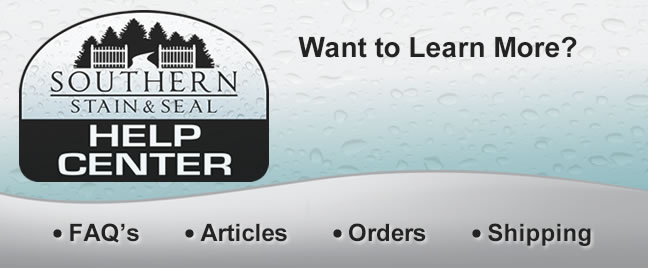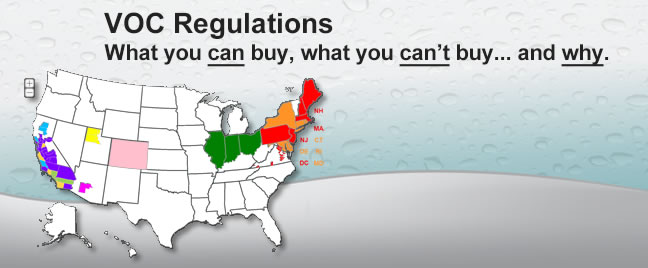Concrete floors can be found in all types of residential, commercial or industrial settings. Concrete floors are hard, durable and easy to clean, but they are also very vulnerable to spills, stains and contaminates. This is especially true for decorative or stained concrete floors. Choosing and maintaining the right sealer or coating for your concrete floor will protect your investment and preserve the beauty of your stained concrete floor.
There are many different choices when it comes to deciding which concrete or cement floor sealer or coating is right for your flooring project. Durability, cost and appearance will all play a part in the decision you make. If your concrete has ever been sealed in the past, you will also need to consider the new sealer’s compatibility with your existing sealer. We offer a full range of sealer options for all types of floor sealing applications. The sealer you choose will also influence the final color and appearance of your stained concrete project. Be sure to see our “Help Center” page specifically for staining concrete floors.
Below, we will discuss the floor cleaning and preparation process, along with the different types of sealers and coatings available for both protecting and beautifying concrete floors. In addition to the resources here in the “help center”, you can also find detailed information for every product we offer, by visiting that product’s page. We know how confusing all of this can be, but that’s what we’re here for! If you have questions, give us a call or send us an email and we’ll be glad to help you through the process.
* Concrete Floor Cleaning and Preparation
Before applying ANY product to ANY steel troweled floor, the surface MUST be opened by chemically etching or by mechanically grinding or shot blasting!!!!!!!!!!!!!!!!!!!! If you plan to short-cut this step, you had might as well go ahead and dump your money down the toilet. Trowel finishing closes the pores at the surface preventing stains, dyes, sealers or any other coating from being able to penetrate and bond. The only exception to this rule is if the floor has been acid stained. Acid stains, if applied to a clean floor, will effectively open the surface enough to allow for bonding of most sealers. If an acid stain has been used, be sure to thoroughly neutralize the surface before sealing or coating the concrete floor.
We carry a full line of floor grinding tools by Diamabrush. These amazing diamond brushes fit most all standard floor machines readily available at your local rental center. They give both homeowners and contractors the ability to properly prep concrete floors without the huge expense of owning a planetary diamond grinder. Many rental stores, including most Home Depot locations, also rent the Diamabrush tools as well.
If your concrete has an existing sealer that has failed, turned yellow or is incompatible with the new sealer you want to use, you will need to remove the old sealer before re-sealing. This can be done by chemical stripping, diamond grinding or shot blasting.
Always review and follow the manufacturer’s recommended guidelines for prep and application of any concrete stain, sealer or coating. You can find these recommendations by reviewing that product’s technical data sheet, along with the “Detailed Info” on that product’s page.
Solvent Based Acrylics
These sealers work well on most colored, stained or dyed concrete. They offer good protection for low-traffic applications and give excellent color enhancement. These solvent-based sealers are effective, economical and offer easy maintenance. As you search for the “perfect sealer” you will likely come across hundreds of solvent-based acrylics, all claiming to be the “best sealer ever invented”. Truth is, there are only a few basic differences in solvent-based acrylics that are even noticeable to the average user. Many (if not most) are the EXACT same products private labeled over and over with a new claim to fame. For a detailed discussion on these differences, see the “Detailed Info” for any of the acrylics listed. For most interior floor sealing applications we recommend using a 25% solids premium pure acrylic. Most solvent-based acrylics are compatible for use over most other solvent-based acrylics, but CANNOT be applied over ANY other type of sealer. Acrylics are not recommended for use on commercial, industrial or garage floor applications. Maintenance will depend on wear and traffic.
- Recommended Products:
 Stamp-Seal
Stamp-Seal
25% Pure Acrylic 2000 Supreme
2000 Supreme
25% Pure Acrylic
Urethanes
Urethanes are the premium family of floor sealers and coatings. Urethanes are UV stable, hard, durable and chemical resistant. They are perfect for high traffic areas and all types of residential, commercial, industrial or garage floor applications. As you will see below, there are several unique sub-categories of this family of coatings. Some are water-based and some are solvent-based. Some create a high-build coating, while others penetrate deep. Some such as 6000-Gloss, PolyKoat and Cat-5 can be applied directly to properly prepared concrete, while others like 6100-Matte should only be applied as a final top-coat over CAT-5, 6000-Gloss, PolyKoat or one of our Epoxies. Take the time to understand each product and carefully evaluate the unique characteristics of each.
Trident CAT-5 has also become our go-to recommendation for priming stained or dyed interior concrete floors. By first applying CAT-5 over your acid stained or acetone dyed concrete, you predictably enhance the color, lock in the dye so it doesn't lift as you are applying the top-coat and create a uniform porosity for even top-coat application. CAT-5 can be used as a stand-alone sealer but is also compatible with most high-performance top-coats such as PolyKoat and 6100 Matte Urethane. We never recommend the use of any acrylic (solvent or water-based) over CAT-5.
- Recommended Products:
 PolyRez 6000
PolyRez 6000
WB Gloss Urethane PolyRez 6100
PolyRez 6100
WB Matte Urethane Trident CAT-5
Trident CAT-5 PolyRez
PolyRez
PolyKoat GL-90
Epoxy
Epoxies are also hard, durable and chemical resistant, but they are less UV stable than urethanes. Epoxies have excellent bond strength when applied directly to properly prepared concrete. We offer two versions of 100% solids epoxy and and a 40% solids water-based epoxy. The 100% solids 250 HP Epoxy is a great choice for solid color industrial and garage floors, as well as a base coat for metallics and flake floors. The 100% solids MaxxFlow Epoxy is specifically designed for metallic applications. The thinner 40% water-based 1040 Epoxy is easy to apply and looks great on all types of concrete. 1040 WB Epoxy is also an awesome primer with outstanding bond strength.
For the ultimate chemical and abrasion resistance, epoxies are often given a final clear top-coat of a Urethane for extra protection against chemicals and abrasion.
- Recommended Products:
 PolyRez
PolyRez
250 HP Epoxy PolyRez
PolyRez
Maxx Flow Epoxy PolyRez 1040
PolyRez 1040
WB Epoxy
Permanent Sealers / Hardeners / Densifiers / Moisture Vapor Barriers
Concrete is like a giant sponge full of tiny pores. Densifiers simply work by filling these pores with silica and reducing porosity. This reduction in porosity not only makes the surface harder, it also stops the movement of moisture and moisture vapor from above AND below the slab. They can also help with protection against oil, gas and other stains, while hardening the surface for easier polishing.
Concrete hardeners or densifiers are most often used when polishing bare concrete, but can also be used to harden, strengthen and internally seal all types of porous, un-sealed concrete surfaces.
- Recommended Products:
 Aqualon L-100
Aqualon L-100
Lithium Densifier Aqualon S-400
Aqualon S-400
Sodium Densifier



















